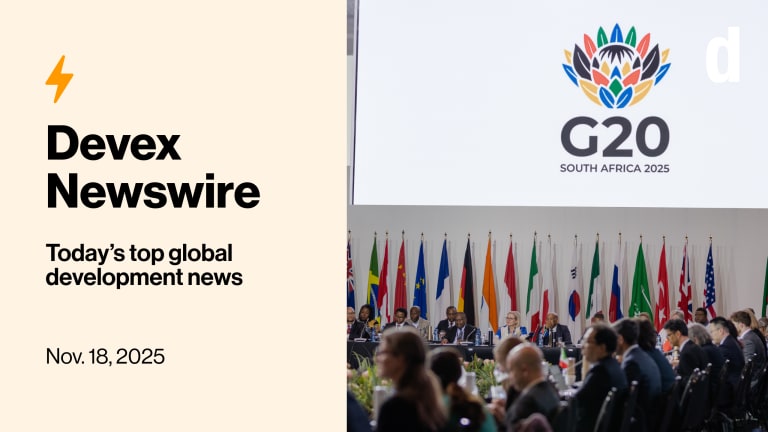
Last week’s U.S.-Africa Leaders Summit was supposed to bridge the gap between U.S. investors and African opportunities — so did it?
That depends who you ask.
“It was not a wasted week,” Mima Nedelcovych, president and CEO of the Initiative for Global Development, told Devex. “There was a lot of good discussion going on ... I’m very pleased.”
Nedelcovych said that the side meetings between U.S. and African business leaders were particularly promising, with U.S. investment in the power sector and information and communications technology taking a front seat. And, he pointed out, the caliber of the African business leaders who were present was very high.
“The point is to get the serious folks there and they were there…The African business leaders came out in very big numbers," noted the IGD chief.
But was it worth the trip?
Definitely not, according to Kola Karim, ranked by Forbes magazine as one of the ten most powerful men in Africa in 2014.
“If it takes 47 African leaders to come to America to get an announcement of additional $7 billion investment on the continent, I’m sorry, there is a question mark,” said the CEO of Shoreline Energy International, a Nigerian energy and infrastructure company. “If it takes African businesses to come all the way here, then I’m sorry.”
Karim explained that African business leaders came to Washington, D.C. in hopes of meeting up with their American counterparts — something that he felt did not happen.
“The big American businesses were not seen,” he said. “I think if you’ve got a beautiful bride you’re trying to court, you want to put on your best suit, you want to put on your best shoes, you want to put on your best shirt … What we’ve seen so far is America just puts on a shirt and puts on a tie, they weren’t putting on their best.”
Karim acknowledged that the summit did result in some significant business partnership and investment announcements. For instance, U.S. investment firm Blackstone and the Nigeria-based Dangote Group announced a $5 billion power infrastructure deal for sub-Saharan Africa, while General Electric and Standard Bank committed $350 million in financing for African power projects.
“But those could have been dealt with without the soiree,” he said.
Mwangi Kimenyi, senior fellow and director of the Africa Growth Initiative at the Brookings Institution, disagreed with Karim.
He acknowledged that expectations for a successful summit may vary and that many of big-ticket partnerships and headline-grabbing investment deals were packaged in advance, but still, he underscored, the summit was productive.
“There were many cases where [African business leaders] were able to discuss with potential investors and expect to follow up with potential deals” and the idea itself was a bold move by U.S. President Barack Obama, Kimenyi said, adding that since many large American corporations are still not in tune with issues in Africa, the challenge is getting them to come to the table for the first time.
Nedelcovych too saw room for improvement, in particular with agribusiness, which in his opinion didn’t get enough attention from U.S. investors.
“We still have a ways to go to get American firms recognizing that there are commercial agribusiness opportunities on the continent,” he said, and highlighted as well the lack of attention given to North Africa compared to sub-Saharan Africa.
Read more on U.S. aid reform online, and subscribe to The Development Newswire to receive top international development headlines from the world’s leading donors, news sources and opinion leaders — emailed to you FREE every business day.








